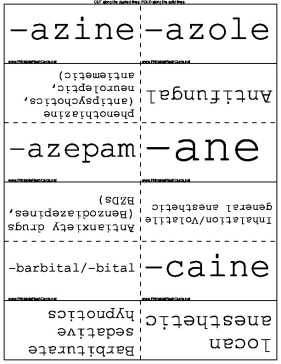

The meanings of drug names can be difficult to understand, but knowing the suffixes used in the name can help you determine a drug's use instantly. These flashcards are perfect for future pharmacists and people who need a more nuanced comprehension of pharmacology.
There are 22 flash cards in this set (4 pages to print.)
To use:
1. Print out the cards.
2. Cut along the dashed lines.
3. Fold along the solid lines.
Sample flash cards in this set:




| Questions | Answers |
|---|---|
| -azine | phenothiazine (antipsychotics, neuroleptic, antiemetic) |
| -azole | Antifungal |
| -azepam | Antianxiety drugs (Benzodiazepines, BZDs) |
| -ane | Inhalation/Volatile general anesthetic |
| -barbital/-bital | Barbiturate sedative hypnotics |
| -caine | locan anesthetic |
| -cillin | penicillin |
| -cycline | antibiotic protine synthesis inhibitor |
| -mycin | aminoglycoside antibiotics |
| -navir | protease inhibitor |
| -olol | Beta Antagonist (beta blocker) |
| -operidol | Butyrophenone (neuroleptic) |
| -oxin | cardiac glycoside (inotropic agent) |
| -phylline | methylxanthine |
| -pril | ACE inhibitor |
| -statin | reductase inhibitors |
| -terol | Beta2 agonist |
| -tidine | h2 antagonist |
| -tropin | pituitary hormone |
| -zosin | postsynaptic alpha1 antagonist (alpha1 blocker) |
| -triptyline | tricyclic antidepressant |
| -ipramine | tricyclic antridepressant |